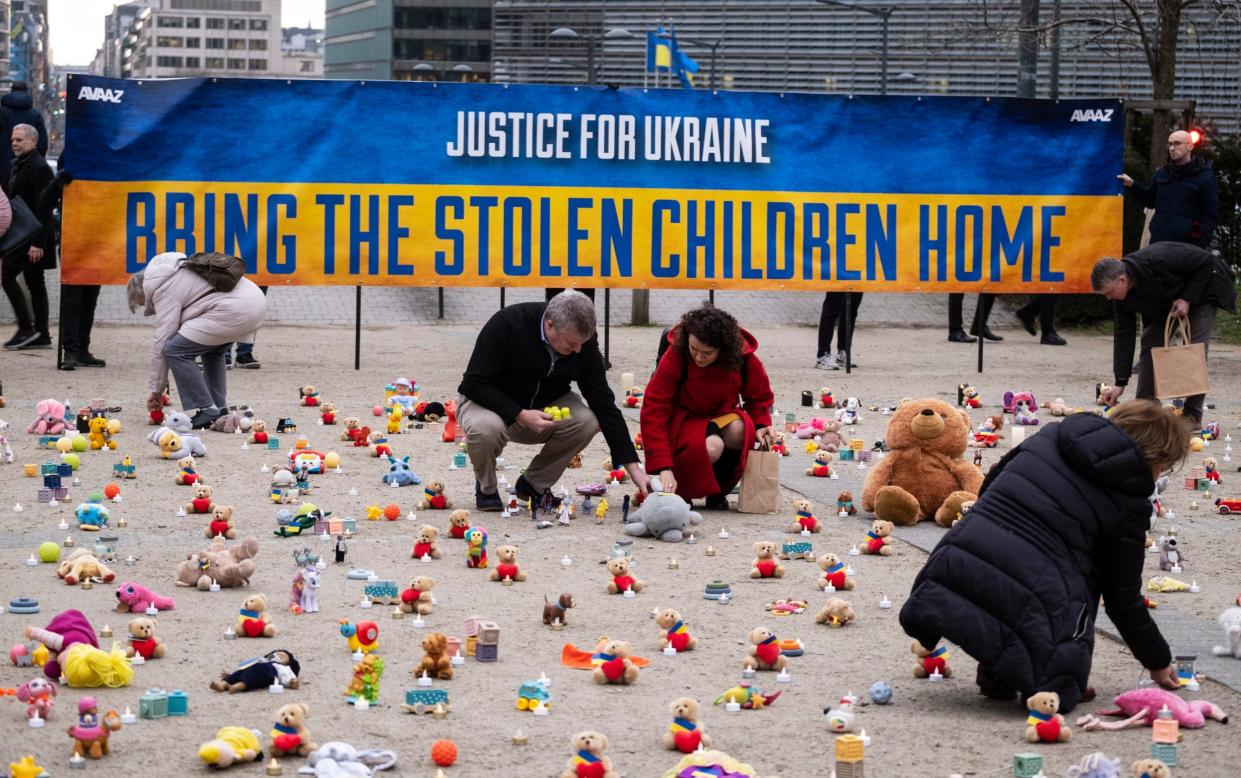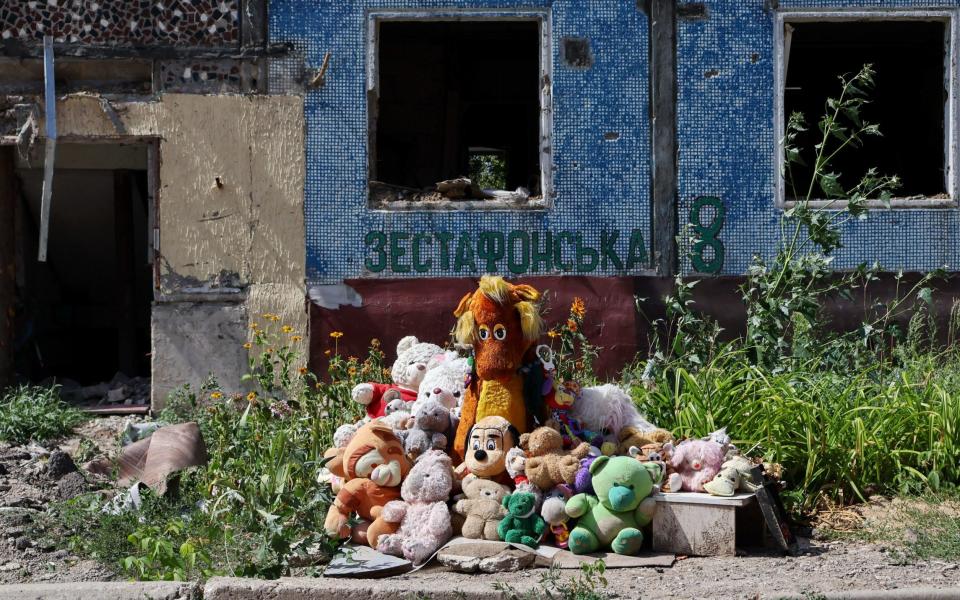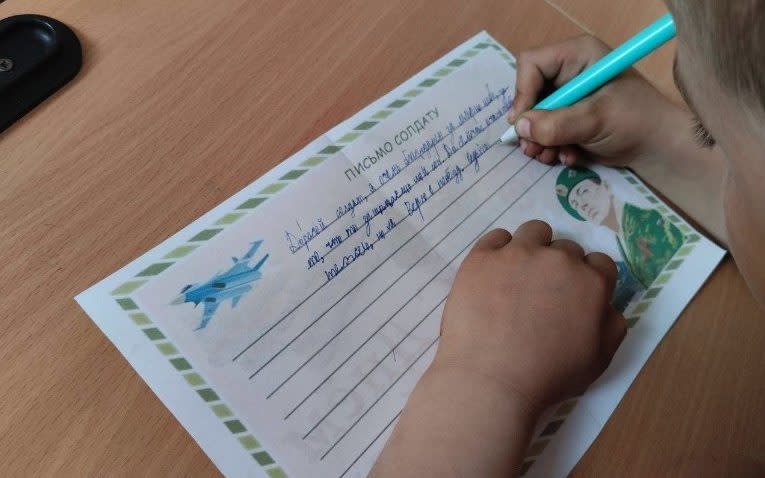Race to save abducted Ukrainian children held by Russia

- Oops!Something went wrong.Please try again later.
Ukrainian children are facing prison for refusing to adopt Russian citizenship as part of Vladimir Putin’s programme of abduction of tens of thousands of minors.
A number of young Ukrainians are being held in detention centres in occupied territories after being rounded up by occupying Russian forces during the war.
Some have been tortured into confessing to crimes, researchers and activists told The Telegraph, and may be moved to Russia and lost in the main prison system there when they turn 18.
Russia’s mass abduction of children has been well documented and was cited on the arrest warrants for Putin and Maria Lvova-Belova, his “children’s rights commissioner”, issued by the International Criminal Court (ICC).

The activists said they were racing to free the children held in occupied territory before they turned 18 and could be moved into the Russian adult penitentiary system, which is often arbitrary and Kafkaesque.
‘Phoney crime’
One teenage boy – whom The Telegraph is choosing not to identify to protect sensitive negotiations – went missing after he left home for a walk early in the war.
His parents said Russian police told them he had been detained for carrying out an alleged terror attack on the Russian state. The boy was taken to a children’s detention centre, where he was tortured into signing an admission of guilt, for what his parents say is a phoney crime.
When his mother protested against the condition of her son – who was left bruised and bloodied by the interrogation, with visible signs of electric shocks – she was soon barred from seeing him again.
The Telegraph can reveal that the boy is one of at least six Ukrainians aged between 13 and 17 who are being held in children’s detention centres on similar allegedly bogus charges.
They were all snatched from towns and villages near Mariupol and Melitopol, in Ukrainian territory captured in the early months of Vladimir Putin’s full-scale invasion in 2022.

They are now at risk of being moved on their 18th birthdays from detention in the occupied cities of Mariupol and Sevastopol – and Russia’s southern city of Rostov – to adult prisons for refusing to take Russian passports.
“The problem with these cases, you can have the best lawyer in Russia or Ukraine… but it is very difficult to dismantle the claims made by Russia because they are fake claims,” said Mariam Lambert, founder of the Dutch Orphans Feeding Foundation, who has been involved in efforts to free the children.
Some 20,000 children taken
Ukraine estimates nearly 20,000 children have been forcibly removed from occupied territory to Russia since the invasion started in Feb 2022.
Many thousands more are missing, with estimates upwards of 100,000 for the number of children that could have been kidnapped by Russia.
The ICC arrest warrants accuse Putin and Ms Lvova-Belova of the war crime of unlawful deportation of children. The Russian president brushed off the warrants by signing a decree that accelerates Russian citizenship for Ukrainian children taken to Russia.
Ukrainian officials and independent humanitarian workers divide the Russian kidnappings into two categories. The first, as with the teenagers detained on phoney charges, is intended to suppress children old enough to disagree with and oppose Putin’s invasion.
The second type is motivated, they say, by a genocidal intent to wipe out the next generation of Ukrainians by making them Russian.
“By targeting and stealing the next generation of Ukrainians, Russia is manifestly demonstrating a brutal extinction policy against the Ukrainian people, implemented alongside the widespread and systematic campaign of torture, ill treatment and unlawful confinement of civilians in occupied territories,” Andriy Kostin, Ukraine’s prosecutor general, said.
In many cases, Russia has taken children from orphanages that have fallen under occupational control.
‘This is not random’
“Russia does not act randomly, it’s a pattern of repeating behaviour,” Mr Kostin said. “Since Feb 2022, Ukrainian children are being gathered from child care institutions across occupied territories and displaced, as far as possible from their motherland, in Russia.
“Some children are directly taken from family or separated from their parents in filtration camps organised by the Russian armed forces and then moved to Russia proper.
“The fate has been similar for those children whose parents died during the sieges of Ukrainian cities or in the course of urban hostilities, and they fell into the hands of the occupying authorities.”
The children are later put up for adoption on Russian government websites, often with falsified Russian identities, including fake names and dates of birth, and no mention of their Ukrainian backgrounds.
A former Ukrainian intelligence officer now independently tracking these listings told The Telegraph he had identified some 35,000 potential adoption adverts that match this description.
Officials and charity workers are using sophisticated software to scrape Russian adoption databases, image recognition tools and public records to confirm these findings.
Bringing the children home is considered a race against time. With many of them abducted before their first birthday, they will have no recollection of their parents or Ukrainian heritage. Even more urgently, as they grow up it becomes harder to identify them.
‘Time is on Russia’s side’
“Time is playing in Russia’s favour,” Daria Zarivna, a Ukrainian presidential aide and head of Bring Kids Back UA, said.
“That means the longer we drag [our feet], and play to Russia’s demands, the harder it will be to recognise these children later.”
There are international efforts aimed at bringing Ukrainian children home. Both Qatar and Saudi Arabia have acted as intermediaries between the Ukrainian and Russian governments on the issue.
The Gulf states have also funded independent trips by Ukrainian parents, who have travelled through checkpoints between Ukrainian and Russian-held territories to Russia to reunite with their children.
These efforts have been slow, with around 400 children being returned since efforts began.
Children taken in 2014
It is a challenge that will continue to plague Ukraine long after its war against the Russian invasion ends.
Ms Lambert said: “Even if the war stopped tomorrow, there would be work for the next 10 years, because these children need to be found, these children need to be rehabilitated and reintegrated.
“For some, I can’t even say reintegrated, because we are not talking about children who have disappeared from 2022... we are also trying to return the children who were taken from 2014 [Russia’s initial invasion of Ukraine], who need to be completely integrated into Ukraine.”


